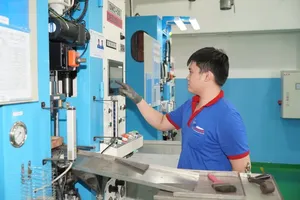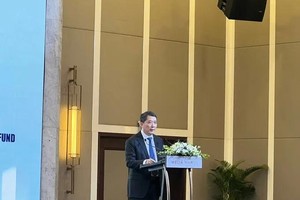 |
Though many commercial banks currently continue to reduce deposit interest rates aiming to reduce lending rates and the interest rates have decreased much compared to the prior few months, many businesses are hesitant to borrow due to business difficulties.
According to the State Bank of Vietnam (SBV), as of March 2023, deposit interest rates have decreased by about 0.5 percent-1 percent compared to the beginning of 2023. Compared to the end of 2022, interest rates have decreased by 1.5 percent -2 percent a year. More than 20 commercial banks have reduced their average lending rates by 0.4 percent compared to the end of 2022.
Specifically, many commercial banks also launch preferential interest rate packages with a reduction of up to 2 percent compared to normal interest rates. However, credit growth in the first three months of 2023 was only 1.61 percent. With this growth, credit in the first quarter of 2023 only reached more than 11 percent of the year's target of 14 percent.
Although the profit in the first quarter of 2023 of commercial banks was relatively good compared to many other industries, the credit growth of many banks in the first quarter of 2023 was lower than in the same period, and even a few banks have seen negative growth. According to experts, the low credit growth is due to the low demand for businesses in the current context.
Speaking at the annual general meeting of shareholders in 2023, Mr. Tu Tien Phat, General Director of Asia Commercial Bank, disclosed that in the first quarter of 2023, ACB's credit decreased by 0.6 percent compared to the end of last year. According to him, this decrease has been driven by weak demand on the part of firms because borrowers demand less credit from banks.
A leader of Orient Commercial Joint Stock Bank also said that credit growth in 2023, especially in the first period of the year, hardly increased sharply. In the past few months, the purchasing managers' index - PMI - has always been below 50 percent, reflecting the continued deterioration of business conditions in the manufacturing industries.
Manufacturing and processing enterprises have been operating in moderation while narrowing their business, so the demand for loans is low. Worse, the real estate market is quiet, interest rates are at a high level, and at this time, few borrowers are willing to buy houses, so credit growth is slow.
A leader of a commercial bank who is deploying 2 preferential credit packages for businesses and individuals at the same time also informed that this bank's preferential lending interest rate is currently below 10 percent a year, but businesses don't borrow much. Even the bank has offered credit products without collateral but no customers have borrowed money.
Inadequately, some export enterprises are eligible for loans but have no need for loans due to a lack of orders. Meanwhile, small and medium enterprises and real estate accept the current interest rates in the market and just want to borrow capital, but banks cannot lend because they are not eligible for loans, he said.
Focus on pushing capital
The report of the Ho Chi Minh City Union of Business Associations (HUBA) shows that, by the end of March 2023, export orders of enterprises in most fields and industries in the southern largest city have decreased sharply. This shows that the bottleneck in the market and export orders is the main reason why thousands of businesses have fallen into a state of moderate operation. That is also the reason for the fall in credit demand.
At a seminar on raising capital for production and business recently held in Ho Chi Minh City, Standing Deputy Governor of the State Bank Dao Minh Tu acknowledged that most businesses in all industries are facing difficulties, so the demand for loans is not high. He announced credit is now very abundant and banks are encouraging lending. The State Bank has directed commercial banks to reduce costs to reduce interest rates and continue to lobby commercial banks to further reduce interest rates to support production and business activities.
However, Mr. Can Van Luc, a member of the National Monetary and Financial Policy Advisory Council, assessed that the deposit interest rate is currently down by about 0.5-1.5 percentage points compared to the beginning of the year, mainly with terms over 6 months. Lending interest rates are also decreasing by 1-2 percentage points compared to the beginning of the year when many banks offer preferential credit packages.
However, interest rates are still high and credit institutions still have to maintain cautious lending conditions when the production and business situation is still difficult, with potential bad debts.
Inter-bank interest rates at the beginning of April 2023 increased 4-5 times compared to the end of March 2023, after the State Bank lowered the operating interest rates, showing that the capital needs of banks are still quite high, but mainly small banks.
Experts said that the increase in inter-bank interest rates again gives a positive signal which means that the demand for the capital of banks is increasing better, proving the prospect that credit is recovering well.
According to the latest data from the State Bank of Vietnam branch in Ho Chi Minh City, credit in the first quarter of 2023 increased by 1.25 percent, less than half of the same period last year - at 3.65 percent.
However, the highest growth rate has seen in March 2023, increasing by 1.37 percent compared to the previous month. ACB's leader also said that, although credit growth in the first quarter of 2023 was negative, credit recovered in March 2023 and increased by 2.2 percent compared to February. With a separate customer positioning segment, the bank is confident that it will complete the credit growth granted by the State Bank.
Many economists said that banks have excess capital, stable exchange rates, and gradually decreasing inflation pressure, which led the SBV to decide to reduce operating interest rates, with the expectation that credit demand will increase in the coming time. In the context that central banks around the world continue to raise interest rates, the State Bank of Vietnam has reduced the operating interest rates for the second time since the beginning of the year.
This shows that the SBV has been loose its monetary policy; however, in the context of a low absorption capacity of the national economy, interest rates must be reduced further to stimulate credit demand to increase again.
According to Mr. Can Van Luc, the economy's capital absorptive capability depends on many factors, not just interest rates. There should be more indispensable solutions to open up other markets such as real estate and corporate bonds.
























